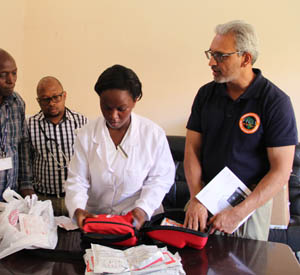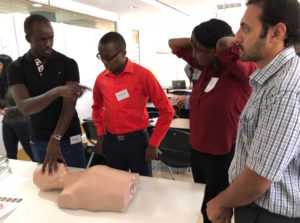Newly Trained Super-Users Take Action Across Kenya

Super-user Sheila, at Thika Hospital, opening new AED’s donated by the Disque Foundation and FICCS.
Empowering others to save lives starts with the right health education and training. Over the years the Disque Foundation has empowered over 700,000 people to save a life. The Disque Foundations most recent trip to Kenya demonstrates a furthering of health education world-wide. The foundation taught CPR and Advanced Cardiac Life Support (ACLS) to medical students and professionals in Nairobi, Kenya and surrounding cities. The students were given free access to our online courses provided by National Healthcare Provider Solutions (NHCPS).
After successfully completing the online courses, the students were trained in-person in ACLS scenarios, by the trained medical professionals from the Foundation for International Cardiac & Children’s Services (FICCS). Three intense days of training, teaching and learning later, the medical professionals completed the work and are now known as super-users of the program.
The mission of our newly trained super-users is to return to their hospitals, and train the doctors and nurse on staff in the scenarios they were just trained in.
A super-user is someone we train in one of our certification courses and in person-trainings, who takes the knowledge and skills they learned, and teaches others in their community. This creates a network of individuals empowered to save lives. The mission of our newly trained super-users is to return to their hospitals, and train the doctors and nurse on staff in the scenarios they were just trained in.

Super-user Vincent (far left) instructing new students at the training in ACLS scenarios.
We followed up the super-users who are now five months post training to hear more about the work they’ve been doing and how the training has made an impact on them and their community. Sheila W. Muchiri and Vincent Othigo are two of our leading super-users, who have since the training, taken huge steps impact others in their community and hospitals with the life saving knowledge of ACLS.
Where do you work?
Sheila: Thika Level Five Hospital, Kenya
Vincent: Kenyatta National Hospital and the Nairobi Women’s Hospital
What is your position?
Sheila: Accident and Emergency, ICU and HDU Medical Officer
Vincent: Accident and Emergency, ICU and HDU
What is your previous training?
Sheila: MBChB (University of Nairobi), Diploma in Preventive Cardiovascular Medicine (University of South Wales)
Vincent: University of Nairobi School of Medicine
How did you find out about the FICCS training?
Sheila: Through a colleague in medical school.
Vincent: One year ago I read a post on Facebook about free training on BLS and ACLS. I applied for it even though it was past the registration deadline, and thankfully found I was still invited!
What did you think of the online NHCPS certification courses?
Sheila: They are comprehensive, up to date, and easy to use. A great resource for anyone whether new to the courses or refreshing their knowledge.
Vincent: It’s a great idea. All the material needed to undertake this course is readily available and easy to understand especially because of the videos. It makes one prepared for the practical bit of the training.
Something you learned at the training? Favorite moment?
Sheila: My favorite moment was conducting my first training. It was an interesting challenge and I got to learn a lot in the process.
Vincent: Three very simple classifications, stable vs unstable, narrow vs wide, and slow vs fast; this must have been one of the most important things I learned. It made the whole training quite simple to comprehend. My favorite moment was the get together we had with the trainers to unwind and talk about stuff that has nothing to do with medicine.
What have you been doing since the training?
Sheila: I co-chaired the first resuscitation committee at the hospital where I work. The committee aims to improve resuscitation practices at the hospital. I designed a questionnaire to establish the knowledge, attitudes, and practices on resuscitation at the hospital. I also helped to conduct an audit of necessary equipment and drugs required in a resuscitation trolley to better equip the hospital with these supplies. The committee is in the process of developing a schedule for hospital-wide training in BLS and ACLS.
Vincent: I’ve gone back to my two jobs where I apply everything I learned from the training on a daily basis.
Biggest takeaway from the training?
Sheila: That we need to improve the standards care of with regards to patients in need of emergency care. We need better recognition and provide prompt and effective response to patients in need of such care.
Vincent: Appreciation for teamwork, you can’t be a one person rescuer when you have people available to assist, both in strength and intellect. Another big takeaway has been the confidence gained when facing emergency situations
What are your goals in the next 5-10 years?
Sheila: To have completed my training and begun my practice in internal medicine-Cardiology.
Vincent: I want to continue with my current line of work maybe for one year then go back to school for my specialization training. I have not quite figured in what field, maybe oncology. I also want to impart the skills and knowledge I have from this training to as many people as possible.
The super-users and the Disque Foundation are living the mission to empower others to save a lives through advanced health care education in underserved areas. This process starts with free education provided to everyone in the world accessible by internet. It is both humbling and powerful to see how our partnership with NHCPS and FICCS has touched the lives of so many. By educating one person, we can educate so many to save a life!
